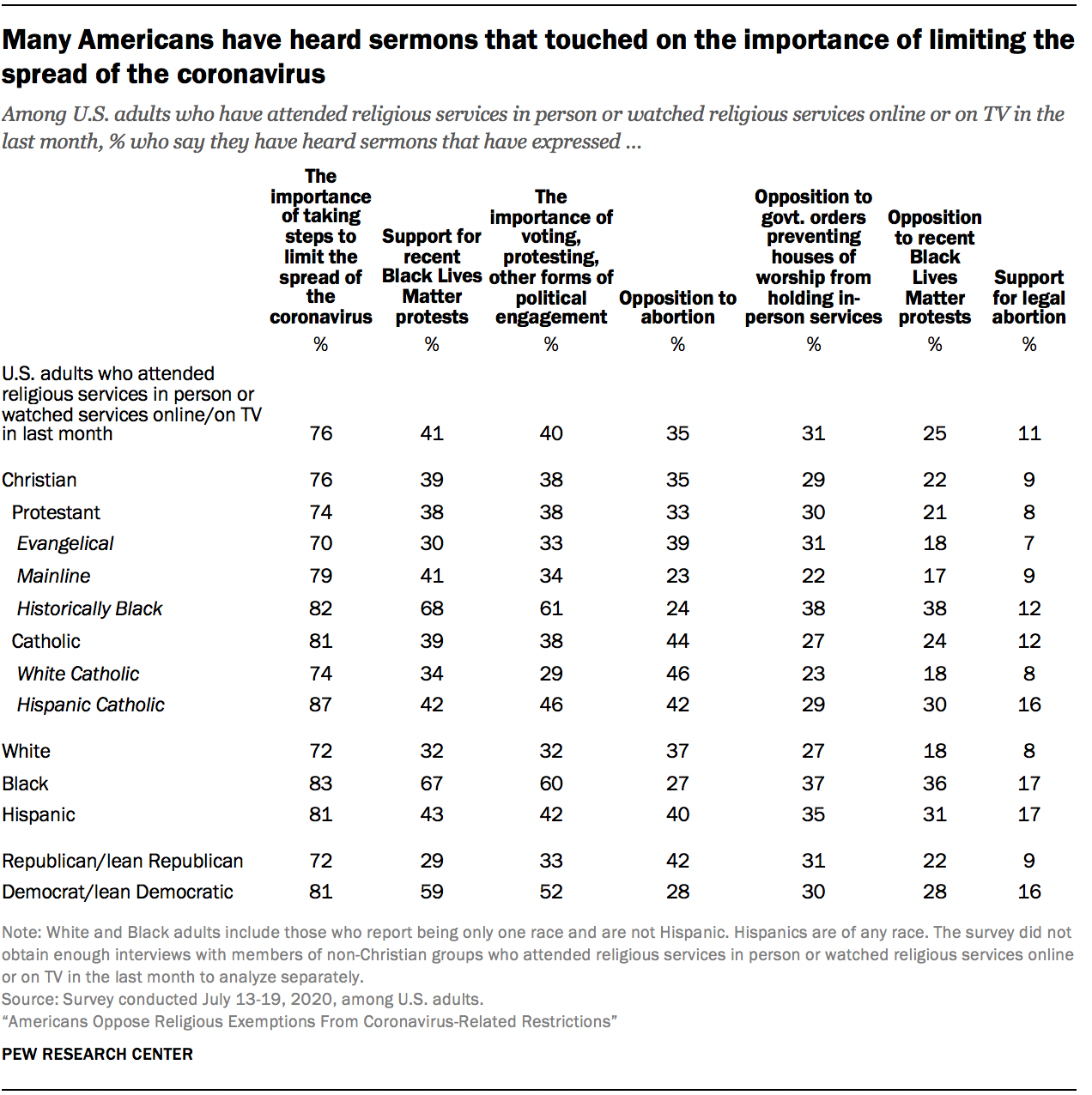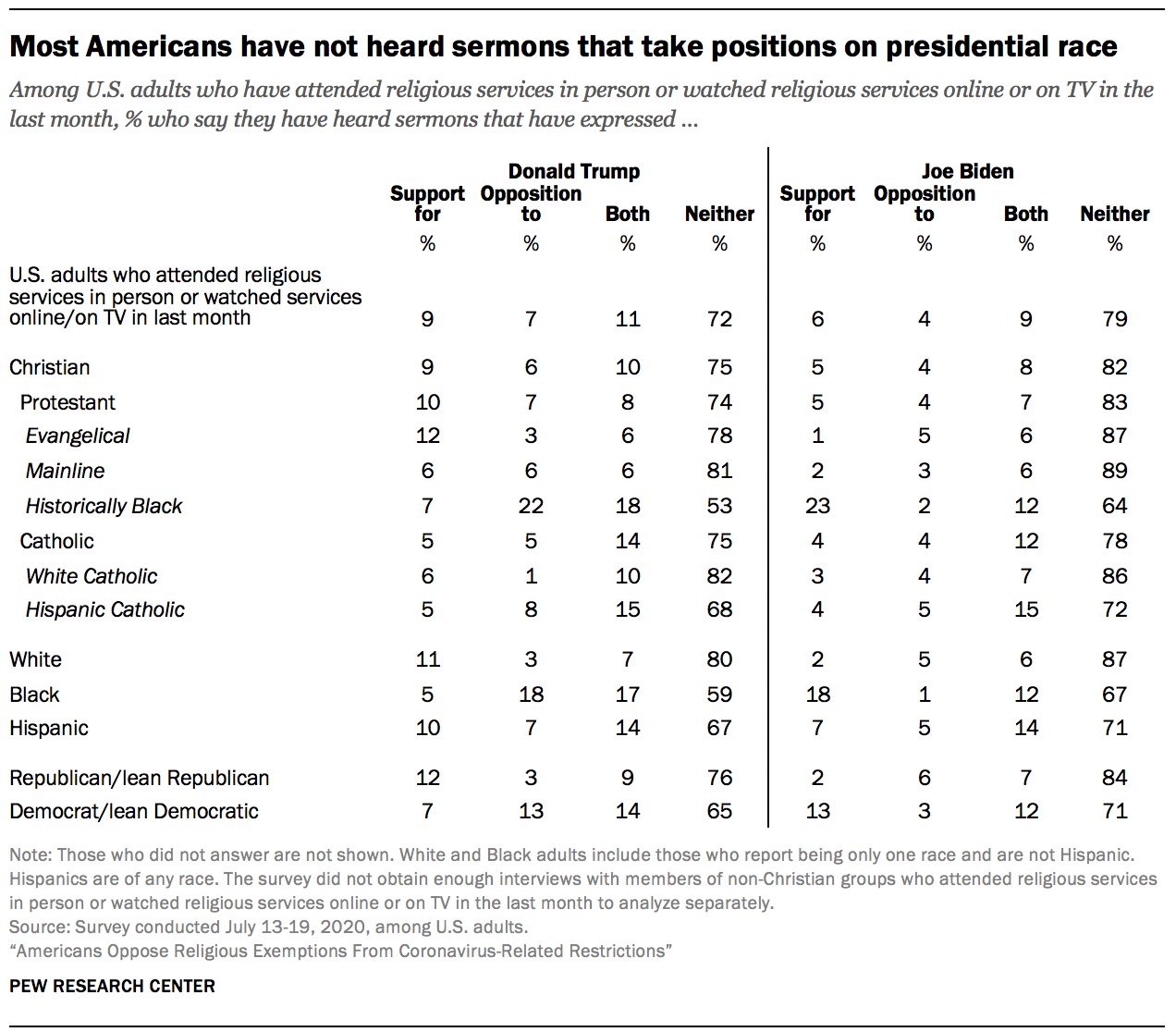The social and political issues that have gripped the country over the past few months also have made their way to the pulpit – both the physical and digital. Among Americans who say they attended or watched religious services in person or online in the month prior to when the survey was conducted in mid-July, three-quarters report having heard sermons that expressed the importance of taking steps to limit the spread of the coronavirus, and a majority of Protestants in the historically Black tradition (68%) heard messages of support for the recent Black Lives Matter protests.
While four-in-ten Americans have heard sermons expressing the importance of voting, protesting and other forms of political engagement, messages of support for – or opposition to – either of the major presidential candidates have been far less common.
Of the specific social and political issues asked about in the survey, mentions of the importance of taking steps to limit the spread of the coronavirus are most prevalent in sermons. Among U.S. adults who say that they have either attended worship services in person or watched services on TV or online in the last month, 76% say that they have heard sermons that expressed the importance of taking steps to limit the outbreak. By comparison, about three-in-ten say they have heard sermons expressing opposition to government orders that prevented houses of worship from holding in-person services.
Large majorities across Christian traditions say that they have heard sermons touching on the importance of limiting the outbreak. Among those who have attended or watched religious services, Democrats and those who lean toward the Democratic Party are somewhat more likely than Republicans and their leaners to say that they have heard content expressing the importance of limiting the virus, and Black and Hispanic respondents are more likely than white respondents to say that they have heard this sentiment expressed. But large majorities of all of these groups have received a similar message of caution about the pandemic.
Respondents also were asked whether they have heard sermons that touched on the recent Black Lives Matter protests that followed the killing of George Floyd by a Minneapolis police officer. Four-in-ten U.S. adults who attended religious services in person or watched services online or on TV in the last month (41%) say that they heard sermons that expressed support for the protests. On the other hand, a quarter say that they heard sermons that have expressed opposition to the Black Lives Matter protests.
Protestants in the historically Black tradition are especially likely to say they have heard sermons in support of the protests (68%), although they also are more likely than most other Christian groups to report hearing opposition (38%). Meanwhile, Democrats are roughly twice as likely as Republicans to have heard sermons that express support for the protests (59% vs. 29%).
A Pew Research Center survey conducted in June posed a related question: Had respondents heard any sermons condemning police violence against Black people? Overall, 37% of U.S. regular attenders (that is, those who said in a 2019 survey that they typically attend religious services at least monthly) reported hearing sermons condemning such violence. Within this group, about half of Black adults (53%) and roughly four-in-ten Hispanics (43%) said that they had heard sermons condemning police violence, while fewer white adults (31%) said the same.
The new survey, conducted in mid-July, also finds large racial and ethnic gaps on the question about Black Lives Matter: 67% of Black worshippers say they have heard support for the protests in sermons, compared with 43% among Hispanics and 32% among whites.
Four-in-ten adults who attended services in person or watched them virtually in the last month say that they have heard sermons that discussed the importance of voting, protesting and other forms of political engagement. Again, Protestants in the historically Black tradition are the only Christian group in which a majority (61%) say they have heard sermons on this topic. In addition, roughly half of Democrats (52%) have heard sermons expressing the importance of political engagement, while just 33% of Republicans say the same.
Respondents also were asked whether they have heard sermons about abortion in the last month. About a third of adults who have attended services in person or watched them online or on TV in the last month say that they have heard sermons opposing abortion, with Republicans more likely than Democrats to have heard such messages (42% vs. 28%). A smaller share of adults who have attended or watched services in the last month say that they have heard sermons expressing support for legal abortion (11%).

Though sermons have contained content on salient political and social issues, specific mentions of the two candidates in the upcoming presidential election are much less common. (There are restrictions on involvement in political campaigns by tax-exempt organizations, including religious institutions.)
About one-in-ten U.S. adults who have attended religious services in person or watched them digitally in the last month (9%) say that they have heard sermons that expressed support for incumbent President Donald Trump, while a similar share (7%) say that they have heard opposition to the president. About one-in-ten (11%) report hearing both sentiments in sermons.
Sermons that expressed support for (6%) or opposition to (4%) the presumptive Democratic nominee, Joe Biden, also are relatively uncommon, although again, one-in-ten (9%) say they have heard multiple perspectives on Biden in sermons. However, Protestants in the historically Black tradition are more likely than other Christians to report having heard sermons that expressed opposition to Trump or support for Biden.
